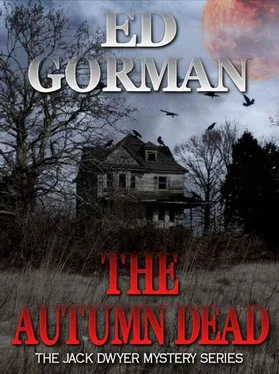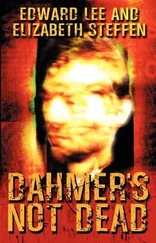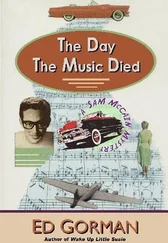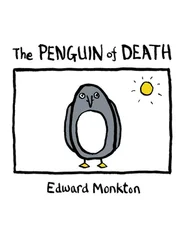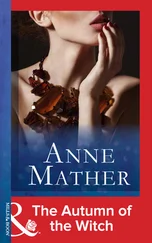Edward Gorman - The Autumn Dead
Здесь есть возможность читать онлайн «Edward Gorman - The Autumn Dead» весь текст электронной книги совершенно бесплатно (целиком полную версию без сокращений). В некоторых случаях можно слушать аудио, скачать через торрент в формате fb2 и присутствует краткое содержание. Год выпуска: 1987, ISBN: 1987, Издательство: Ballantine, Жанр: Криминальный детектив, на английском языке. Описание произведения, (предисловие) а так же отзывы посетителей доступны на портале библиотеки ЛибКат.
- Название:The Autumn Dead
- Автор:
- Издательство:Ballantine
- Жанр:
- Год:1987
- ISBN:9780345356321
- Рейтинг книги:5 / 5. Голосов: 1
-
Избранное:Добавить в избранное
- Отзывы:
-
Ваша оценка:
- 100
- 1
- 2
- 3
- 4
- 5
The Autumn Dead: краткое содержание, описание и аннотация
Предлагаем к чтению аннотацию, описание, краткое содержание или предисловие (зависит от того, что написал сам автор книги «The Autumn Dead»). Если вы не нашли необходимую информацию о книге — напишите в комментариях, мы постараемся отыскать её.
The Autumn Dead — читать онлайн бесплатно полную книгу (весь текст) целиком
Ниже представлен текст книги, разбитый по страницам. Система сохранения места последней прочитанной страницы, позволяет с удобством читать онлайн бесплатно книгу «The Autumn Dead», без необходимости каждый раз заново искать на чём Вы остановились. Поставьте закладку, и сможете в любой момент перейти на страницу, на которой закончили чтение.
Интервал:
Закладка:
I turned out my light and left her there in the weeds and went on up the sloping gravel drive to the dark house.
Itried my American Express card and when that didn't work I went over into the garage and got a screwdriver and tried that and that didn't work either, so I did what the real novice criminal does; I took off my jacket and wrapped it around my fist and then pushed my fist through the back-door window, the noise of smashing glass almost obscene in the stillness, and then I took the jacket off my hand and slid it back over my body and simply reached in through the broken window and undid the lock.
Inside, I went through a back porch that smelled of apple cider and lawn fertilizer. Then I went through a kitchen that smelled of the sort of food you fix in a wok. Then I went through a dining room big enough to give a major restaurant some problems. Moonlight shone softly through a line of long, narrow windows onto the ghostly white cloth covering the formal dining table and the built-in buffet. The living room had a soaring ceiling, a real Palladian window, and a fireplace above which hung a McKnight print. Evelyn may have suffered from mental problems; she certainly hadn't suffered from poverty.
I went up the stairs to my right, the sound of my footsteps lost in the deep-pile carpeting and the noise of the wind outside.
The second floor was every bit as impressive as the first. There was a master bedroom Tut would have envied, complete with a sunken bathtub big enough to hold swim tryouts in, and a den filled with forty years of Book-of-the-Month Club selections, all those oddments from curios like Jack Paar to the real stuff like William Faulkner.
The room where the boy had lived was easy enough to identify. There were a single bed, a bookcase with twenty-five cent paperbacks of Robert Heinlein, Jerry Sohl, Mickey Spillane, and several of the Dobie Gillis books. The closet contained chinos with little belt buckles in back, the kind that had been popular at the time he'd died in 1962, and the bureau drawers orderly stacks of white socks and jockey shorts. On the walls were posters of the Beach Boys (Brian looked to weigh about 100 pounds in those days) and Elvis with his sneer.
In other words, nothing useful.
Two doors down the hall my luck changed. What appeared to be nothing more than Evelyn's room with its Wedgwood blue curtains and matching bedspread and stuffed animals (a duck's eyes seemed to sparkle with intelligence, watching me) proved otherwise once I sat down at her desk.
Next to a Wang computer was a large reel-to-reel tape recorder that was patched into a phone system sitting next to it. I wondered what this was all about. I turned on the recorder, tiny amber lights haunting the darkness, and sat down and listened.
"You know who this is, don't you?" This was Evelyn's voice.
"I'm getting very goddamn tired of this."
"You're protecting that woman. It's time you came forward."
"I have to go now." Not until then had I realized whose voice it was. Ted Forester's.
"If you go, I'll phone the police."
A sigh. "How much money do you want?"
"You should know me better than that by now, Mr. Forester."
"I–I'm in no position to go to the police."
"You know she killed him."
"I really need to-"
"Why are you protecting her?" Anger had begun to edge into her voice.
"I'm not protecting her."
"Of course you are. All three of you are. And I won't let you anymore. I won't let you. You'll see." By now she was in tears, her own kind of dark psych-ward tears. There was rage but there was no power, she was drifting off into her madness and so she did the only thing she could. She hung up.
I let the tape roll and sat there in her room and felt sorry for her again, thinking of her freckles and her crazed eyes. She was one of those born truly luckless; not even money could put her life back together again.
The next conversation was with Larry Price. Predictably, he was not as diplomatic as Forester had been. He cursed her a lot and threatened her a lot and it was he, not she, who hung up.
Then came Dave Haskins. From the beginning, he sounded miserable. Over and over he said, "You don't understand what's going on here. We're not-" Then he stopped.
"You're not what?"
"I can't say. Ted and Larry would-"
"Hurt you?"
"Yes, God, don't you understand that? That's exactly what they'd do. They'd hurt me."
"She killed Sonny. And I'm taping all these conversations to turn over to the police. And-"
"If you want to talk to somebody, don't talk to me, all right? Ted and Larry are the ones-"
"I followed you the other day."
"What?"
"I followed you."
"Why?"
"I follow all of you. I follow everybody." She paused. "You almost went to the police, didn't you?"
He said nothing.
"Didn't you?"
Very softly: "Yes."
"You're getting tired of it, aren't you?"
"Yes."
"You're the only good one of the three. And I'm not just saying that. I've followed all of you and I've talked to you on the phone and I know that you're the only good one of the three. I know that. " She was going off again, and the rest of the conversation consisted mostly of her telling him how good he was and wouldn't he please go to the police. But all he said at the end, and obviously without any conviction, was "Give me a few days to think about it, all right? Please give me a few more days."
The next call was the real shocker and as soon as I heard who it was I thought of what Dr. Evans had said, that Karen's pattern was to have a new lover waiting in the wings before she got rid of the old one. And Evans had sensed that there was, in fact, a man in her life at the time Karen had been withdrawing from him.
I sat there in the prim pleasantness of the dead woman's bedroom and listened to the voice, an old-familiar voice, and didn't know what to think or say or do; I just thought of all the people involved, and all the people betrayed.
After a time, I turned off the player and just sat there, listening to the night wind and lonely creaking of a house where anything like real life had stopped in the summer of 1962.
Then I got angry and it was what I needed just then, real anger, and I went down the stairs and out of the house and down the gravel road past where Evelyn lay sprawled in her leathers like some piece of trendy violent sculpture, and I got in my Toyota.
Ten minutes later I was at a drive-up phone.
"You can go home now."
"Really?" Donna said. "You're not worried about that woman anymore?"
"She's dead."
Pause. "You don't sound so good, Dwyer."
"I don't feel so good."
"Why don't you meet me at my apartment in an hour or so."
"There's something I've got to do."
"It doesn't sound like something that's going to make you very happy."
So I thought about it and then I talked about it and then I felt much better than I should have, much better than I would have keeping silent. Donna does that for me.
Chapter 27
"Jack."
"Hi. Gary home?" I tried sounding as if it were Christmas and I were dropping off presents for the kids and I were wearing a red Santa cap and a glow from toddies, but I knew better and she knew better, too.
"What's wrong?"
"Nothing."
"Jack, come on. I've known you a long time. Something's up."
"It's probably nothing. I just need to see Gary."
"He's at school."
"At this time?"
"He teaches a course in creative writing at night. Adult ed."
"I see." I stared past her into the house. It was inevitably tidy, tidy as she was, with the same kind of poor but resolute dignity. "I'm going to ask you something, and I wouldn't blame you if you'd ask me to leave."
"God, Jack." She put her hands to her face. "You're scaring me."
Читать дальшеИнтервал:
Закладка:
Похожие книги на «The Autumn Dead»
Представляем Вашему вниманию похожие книги на «The Autumn Dead» списком для выбора. Мы отобрали схожую по названию и смыслу литературу в надежде предоставить читателям больше вариантов отыскать новые, интересные, ещё непрочитанные произведения.
Обсуждение, отзывы о книге «The Autumn Dead» и просто собственные мнения читателей. Оставьте ваши комментарии, напишите, что Вы думаете о произведении, его смысле или главных героях. Укажите что конкретно понравилось, а что нет, и почему Вы так считаете.
